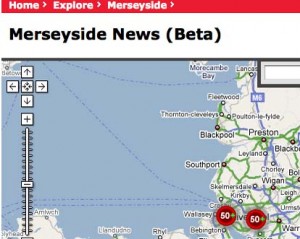ELPAIS.com and Soitu.es claimed the first general excellence awards for non-English language sites at the Online News Association (ONA) 2008 awards on Saturday.
Speaking of ElPais.com, the judges said the site was ‘a shining example of how traditional media can blossom in the digital arena.’
“On a bedrock of first-class journalism it has built a brilliant suite of infographics that are rich in information, yet easy to consume,” they added in a press statement.
‘Bearing Witness‘, Reuters multimedia coverage of fallout from the invasion of Iraq in 2003, took the best multimedia feature award in the large sites category, while Adrian Holovaty’s EveryBlock was awarded the prize for outstanding use of digital technology by a small site.
A full list of the winners across the 23 awards and comments from the judges is available through the ONA awards website, but are listed in brief below:
Knight award for public service – WashingtonPost.com, Fixing D.C. Schools
General excellence (small site)– ArmyTimes.com
General excellence (medium site) – LasVegasSun.com
General excellence (large site) – CNN.com
General excellence, non-English (small site) – Soitu.es
General excellence, non-English (large site) – ELPAIS.com
Breaking news (medium site) – STLtoday.com, St. Louis Post-Dispatch, Kirkwood shootings
Breaking news (large site) – NYTimes.com, Eliot Spitzer’s resignation
Investigative journalism (small site) – RecordOnline.com, The Times Herald Record (Middletown, N.Y.) “I Didn’t Do That Murder”: Lebrew Jones and the death of Micki Hall
Investigative journalism, (large site) – DallasNews.com, The Dallas Morning News, Unequal Justice, and The Globe and Mail, Talking to the Taliban
Multimedia feature (small site) – GEO.fr, Hidden World
Multimedia feature (medium sites) – STLtoday.com, St. Louis Post-Dispatch, Reporting for Duty
Multimedia feature (large site) – Reuters.com, Bearing Witness
Online commentary (small site) – Mark Fiore, MarkFiore.com, animated political cartoons
Online commentary (medium site) – The Bottom Line, DallasNews.com, The Dallas Morning News
Online commentary (large site) – God-O-Meter, Beliefnet.com
Online video presentation – OregonLive.com, The Oregonian, Living to the End
Outstanding use of digital technology (small site) – Everyblock.com
Outstanding use of digital technology (large site) – DesMoinesRegister.com, Iowa Caucuses
Specialty site journalism – WebMD
Student journalism – University of North Carolina, Chapel Hill & Universidad de los Andes, South of Here, and Taylor Hayden, Western Kentucky University, Closer to Home: A Daughter Becomes Caregiver
Topical reporting (small sites) – Azstarnet.com, Arizona Daily Star, Immigration in the Spotlight
Topical reporting (large sites) – USAToday.com, Today in the Sky

